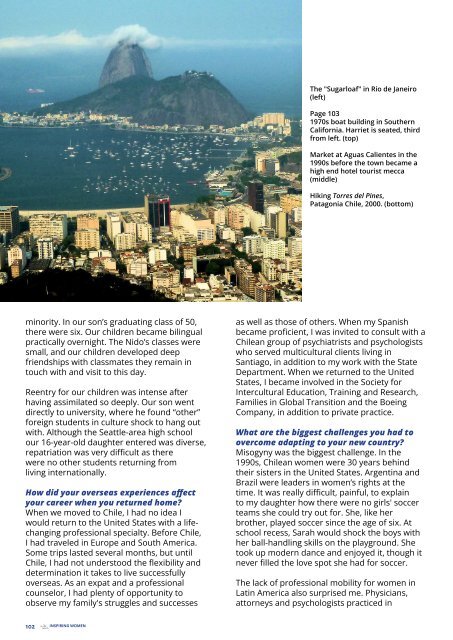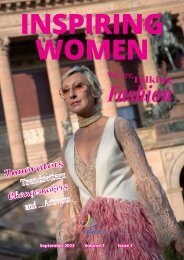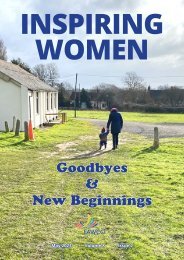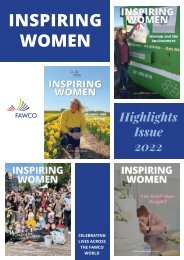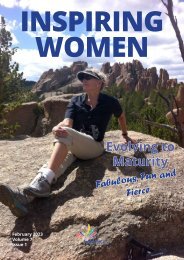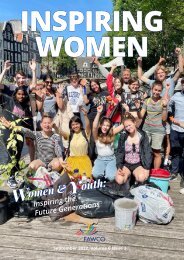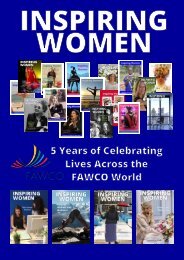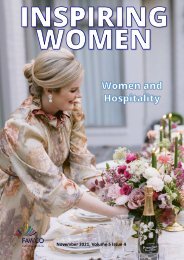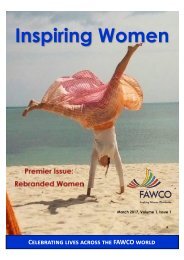Inspiring Women Magazine November 2023
Create successful ePaper yourself
Turn your PDF publications into a flip-book with our unique Google optimized e-Paper software.
minority. In our son’s graduating class of 50,<br />
there were six. Our children became bilingual<br />
practically overnight. The Nido’s classes were<br />
small, and our children developed deep<br />
friendships with classmates they remain in<br />
touch with and visit to this day.<br />
Reentry for our children was intense after<br />
having assimilated so deeply. Our son went<br />
directly to university, where he found “other”<br />
foreign students in culture shock to hang out<br />
with. Although the Seattle-area high school<br />
our 16-year-old daughter entered was diverse,<br />
repatriation was very difficult as there<br />
were no other students returning from<br />
living internationally.<br />
How did your overseas experiences affect<br />
your career when you returned home?<br />
When we moved to Chile, I had no idea I<br />
would return to the United States with a lifechanging<br />
professional specialty. Before Chile,<br />
I had traveled in Europe and South America.<br />
Some trips lasted several months, but until<br />
Chile, I had not understood the flexibility and<br />
determination it takes to live successfully<br />
overseas. As an expat and a professional<br />
counselor, I had plenty of opportunity to<br />
observe my family's struggles and successes<br />
The "Sugarloaf" in Rio de Janeiro<br />
(left)<br />
Page 103<br />
1970s boat building in Southern<br />
California. Harriet is seated, third<br />
from left. (top)<br />
Market at Aguas Calientes in the<br />
1990s before the town became a<br />
high end hotel tourist mecca<br />
(middle)<br />
Hiking Torres del Pines,<br />
Patagonia Chile, 2000. (bottom)<br />
as well as those of others. When my Spanish<br />
became proficient, I was invited to consult with a<br />
Chilean group of psychiatrists and psychologists<br />
who served multicultural clients living in<br />
Santiago, in addition to my work with the State<br />
Department. When we returned to the United<br />
States, I became involved in the Society for<br />
Intercultural Education, Training and Research,<br />
Families in Global Transition and the Boeing<br />
Company, in addition to private practice.<br />
What are the biggest challenges you had to<br />
overcome adapting to your new country?<br />
Misogyny was the biggest challenge. In the<br />
1990s, Chilean women were 30 years behind<br />
their sisters in the United States. Argentina and<br />
Brazil were leaders in women’s rights at the<br />
time. It was really difficult, painful, to explain<br />
to my daughter how there were no girls' soccer<br />
teams she could try out for. She, like her<br />
brother, played soccer since the age of six. At<br />
school recess, Sarah would shock the boys with<br />
her ball-handling skills on the playground. She<br />
took up modern dance and enjoyed it, though it<br />
never filled the love spot she had for soccer.<br />
The lack of professional mobility for women in<br />
Latin America also surprised me. Physicians,<br />
attorneys and psychologists practiced in<br />
settings under male directors<br />
or had home offices. School<br />
principals and department<br />
chairs at universities were all<br />
men. Domestic violence and<br />
rape were tolerated in a way<br />
they were not in North America.<br />
How did you embrace your<br />
new culture? Is there<br />
something you can tell us<br />
about that culture that made<br />
you happy?<br />
We were fortunate as one of<br />
Charlie's colleagues had studied<br />
in the United States and took us<br />
under his family’s wing, inviting<br />
us for meals and showing us<br />
where to shop. He had children<br />
near our children’s ages. The<br />
kids got along. Through the<br />
American <strong>Women</strong>’s Club, I met<br />
long-time expat women who<br />
were an invaluable resource for<br />
just about everything!<br />
Chilean folk songs are lovely,<br />
with traditional guitar or<br />
sometimes brass<br />
accompaniment. They often<br />
have unrequited love themes<br />
not unlike traditional country<br />
and western songs in the<br />
United States. The songs are<br />
easy to sing along with and<br />
are often done as sing-alongs in<br />
bars or at parties. On<br />
September 18, National<br />
Independence Day, with the<br />
Festivas Patrias and Chilean<br />
Cuecua, there are dances at<br />
parties and in the street, and a<br />
great time is had by all.<br />
In your travels, what was your<br />
favorite culture you encountered?<br />
Why?<br />
Over time, I have been<br />
fortunate to visit several<br />
Brazilian states, both rural and<br />
urban, for work and vacations.<br />
I love Brazilian music, the<br />
country’s energy and its<br />
incredible physical beauty. I<br />
am not fluent in Portuguese,<br />
but with its similarity to Spanish<br />
and French, I have picked<br />
up enough of the language<br />
to communicate.<br />
102 INSPIRING WOMEN INSPIRING WOMEN 103


